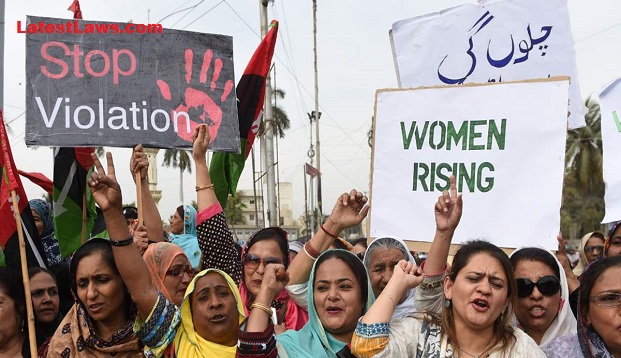March 25, 2019:
When a Hindu family complained to the police about the kidnapping of their two minor daughters, the official response was apathy.
It took a viral video clip of the mourning father - and subsequent outrage on social media - to force the Pak Govt to announce a probe into yet another case of forced conversion of girls from minority.
On the eve of Holi, Reena Meghwar (12) and Raveena Meghwar (14) were kidnapped from their home in Dahrki in Sindh's Ghotki district. Another Hindu girl had also been reportedly abducted from Mirpukhas district.
The issue of forced conversion is not new in Pakistan. As documented in Bring Back Our Girls , the number of incidents has been rising because of religious extremism in northern Sindh.
Rarely has any action been taken against the abductor, and the girls are usually not returned to their families.
Hundreds of similar cases raise a number of pertinent questions.
Why do only minor Hindu and Christian girls 'convert'? Why don't aren't they brought to the courts if they want to convert? Why are only religious leaders in shrines seen converting girls, especially Mian Mithoo who runs Bharchundi Dargah in Ghotki, Sindh?
The same questions can be asked about the kidnapping of the two girls from Ghotki.
The family registered a first information report stating that the girls were under age on March 20. However, there had been no public response from the Sindh police till the videos of the two girls being married by a cleric emerged on social media.
that the girls were saying they had left their homes of their own free will and converted to Islam voluntarily.
The police complaint by the family had clearly mentioned that the girls were under age. There are clear provisions under the Sindh Child Marriage Restraint Act which prohibits child marriage, and the local police could have taken action against the accused and recovered the girls.
Instead, Sindh police's tweets seemed to justify the 'abduction' by only mentioning the statements of the two girls. The perception is that the police deliberately delayed action, which allowed the girls to be moved outside the province to Rahimyar Khan, a city in Punjab.
On Saturday, a video ofReena and Raveena's father sitting in protest at the local police station emerged, and immediately went viral on Twitter. 'Oh - Nadir Shah - you can kill me. I will never tolerate this. My daughters have been abducted - I had patience,' he shouts.
After the clip of the grieving father was shared widely, a leader of the Pakistan People's Party, the ruling party in Sindh, said the case was being investigated. However, the Meghwar family has said they have not been contacted by anyone from the Sindh or Federal governments so far.
According to the girl's brother, Shamon Meghwar, no politicians or influential members of the Pakistani Hindu community have contacted them till now. Lawyer Dilip Kumar said that the girls should be returned to the family as they are minors.
However, as per reports, the girls have sought protection from a court in Bahwalpur. They will likely appear before a court on Monday (March 25).
The case has also become entangled in the current tensions between Pakistan and India. Indian external affairs minister Sushma Swaraj, which was to by Pakistan information minister Fawad Chaudhry.
On Sunday, Pakistani Prime Minister Imran Khan called on the Sindh and Punjab governments to constitute a probe and recover the two sisters.
In 2017, the PPP-ruled Sindh government had brought a law against forced conversion, which was passed by the provincial assembly. But Sindh governor Saeeduzzaman Siddiqui returned the Bill for reconsideration after a phone call from the right-wing Jamaat-e-Islami's Sirajul Haq to PPP co-chairman Asif Ali Zardari.
'Forced marriages are illegal and child marriages are unethical and unconstitutional marriages, no one can accept it. It must be stopped,' said Nafisa Shah, who is a member of the National Assembly from the Pakistan People's Party.
She added that her party's concern about forced conversation was the reason why it had passed the 2013 Sindh Child Marriage Restraint Act. She highlighted that as per Pakistan's constitution, the age of consent for marriage for a woman is 16, but it was pegged at 18 in the Sindh Act.
Shah said that the Sindh government should follow the case of Reena and Raveena as per the law. 'We firmly believe that the girls should be sent to their parents and our Sindh chief minister Murad Ali Shah should keenly follow the case,' she stated.
To a question on whether this case also could be a repeat of the Anjali Kumari case, who was not sent back to her family, she replied, 'Finally - courts have to proactive. We cannot afford that girls are abducted and then another girl goes missing. This sends a negative message.'
After the latest case, the debate over the need for a specific law against forced conversion has been renewed.
'The time has come to bring legislation on forced conversion, because forced conversion is old issue,' said Ramesh Kumar Vankwani, patron-in-chief of the Pakistan Hindu Council and a member of National Assembly.
'The state had brought the National Action Plan against terrorism to ban terror organisations. Therefore, a law should be brought to ban shrines that convert minor girls to Islam,' he said.
He urged the Sindh government to push the dormant legislation on forced conversion again, and pass it in the provincial assembly.
The Federal Govt should also consider a similar law, he suggested. 'Enough is enough,' he asserted.
Source Link
Picture Source :

























